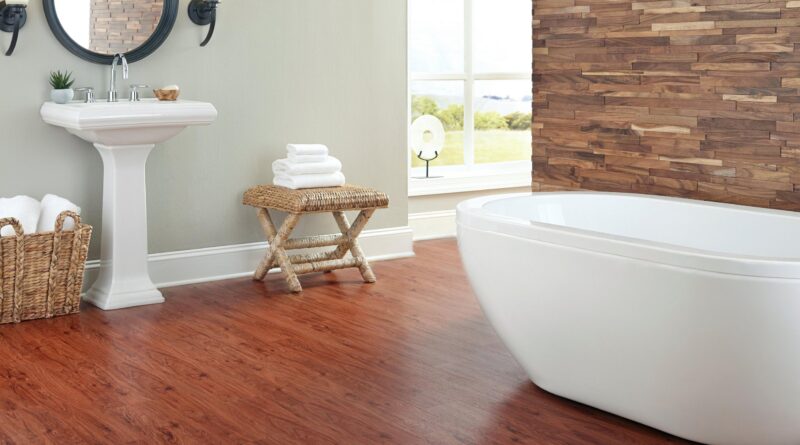Pros & Cons Of Vinyl Flooring In Your Bathroom
Choosing the right floor for a bathroom can be challenging because a weak floor can suffer moisture damage, leading to dampness and mold growth. Several materials are suitable for bathrooms. As a result, many luxury floorings are not suitable for humid environments.
In recent years, vinyl flooring has become increasingly popular because it offers great value. The main disadvantage of stone and ceramic tiles is that they are very slippery. Vinyl is available in various colors, styles, and designs, so you can find a floor covering that fits any decor. Today, vinyl options are available in sheets and tiles of increasingly higher quality.
It is becoming a popular choice for homeowners for its low price and easy installation. You can quickly add these flooring types to your bathroom if you are a DIYer.
Types of vinyl flooring
- Vinyl plank flooring
- Sheet vinyl
- Vinyl tiles
Several DIY projects use high-quality vinyl plank flooring and highly water-resistant sheets. Usually, people choose vinyl tiles for bathroom floors because they are affordable. Make sure you consider these factors before choosing the floor.
Does the flooring match your style?
- Does the floor last a long time?
- Is it resistant to water?
- Is the floor easy to install?
- Is it safe for children and pets?
Due to high moisture levels, there is a need to find a durable and waterproof floor for kitchens and bathrooms. Below we list vinyl flooring’s pros and cons.
Pros of vinyl flooring
1. It is water-resistant.
There is no doubt that vinyl flooring offers this advantage. Water resistance is one of their most notable attributes. Vinyl flooring is only waterproof, not impervious. The floor has a nonporous surface. PVC is ideal for moist environments due to its ability to resist moisture. This makes them the perfect choice for moist environments. It’s better to install water-resistant flooring because it won’t wear down as quickly over time. Waterproof flooring has a long lifespan and won’t damage easily.
2. It provides a realistic 3D effect.
As you may know, hardwood has a luxurious and soft appeal, unlike marble and stone. In comparison to marble and stone, vinyl has many choices. For instance, you can get any desired appearance that mimics wood or tile. In addition, they have realistic 3D visuals. It is better to choose vinyl for the best look and cost if you still decide to spend money on the floor.
3. Stain-resistant
It is easy to keep your floor clean due to the transparent top layer of vinyl sheets and tiles, which protects your floor from spills and stains. However, solid and composite vinyl tiles do not have this top shield and are prone to stains, which must sometimes be cleaned and polished.
4. Require lesser maintenance
You do not need to provide extensive care for vinyl floors. They simply require mops to remove dust and dirt. However, you should avoid detergents, waxes, polishes, and ammonia. Furthermore, it would help if you never used sponges or scouring pads on vinyl. However, you can prepare a DIY solution to clean vinyl. For instance, mix vinegar with water. You can also mix dishwashing liquid with water to keep the floor shining. Both work well.
5. Stylish and comfortable
As you may expect, these floors are very comfortable to walk on and provide a lot of cushioning. And they are perfect for joints and feet. Furthermore, they have excellent insulation, so they remain warm during winter. Because bathrooms are constantly wet and cold due to constant water flow, this is, without a doubt, the perfect flooring choice.
Cons of vinyl flooring
It is also true that vinyl floors have many disadvantages, just like hardwoods or laminates.
1. Damage is possible to these floors.
Despite their durability, these floors are soft when compared with hardwood. This type of floor is easily damaged compared to ceramic or natural stone. In addition, these materials can’t resist sharp objects like screws and knives. Additionally, they cannot handle metal chairs or rolling carts. A scratch or dent on these floors occurs quickly.
2. Repairing vinyl takes work.
You need to replace the flooring when the damaged area gets severely damaged and scratched or dented. This can be done by removing or replacing the damaged area with new flooring. You will only be able to have a perfect floor if you replace the existing floor with a new one. As a result, you should hire an expert or professional to do this for you.
Conclusion
In the same way as other floors, vinyl plank flooring has its advantages and disadvantages. It has its benefits, but repairing it requires work. Once it is damaged, you will have to replace it. However, it all depends on the traffic. In addition, it is important to properly weigh its pros and cons to determine whether it is the right choice for your bathroom.
